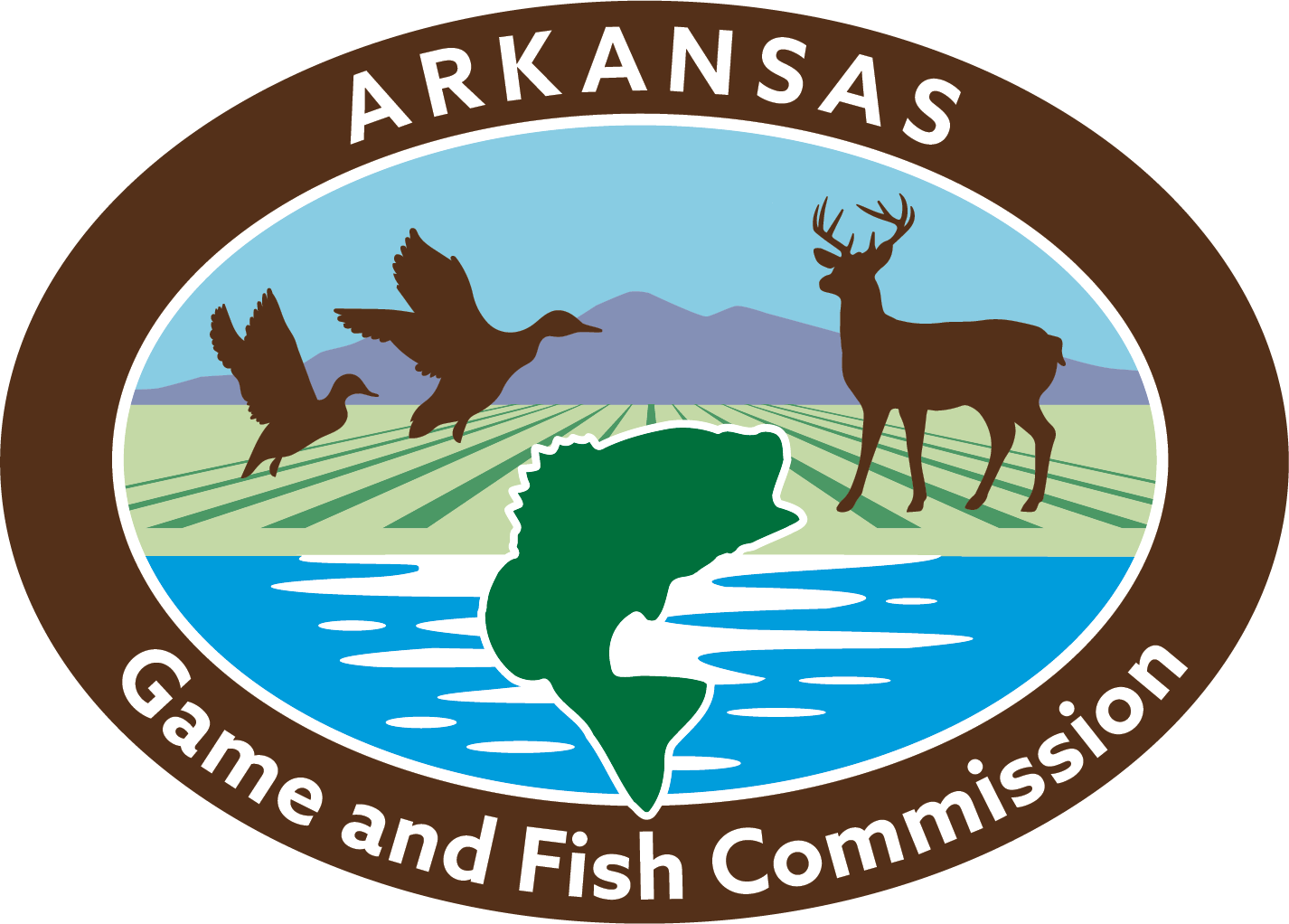Private landowners may purchase the approved farm-raised species listed below from AGFC-permitted sources (Resident/Non-Resident Fish Farmer, Resident/Non-Resident Fish Dealer / Independent Hauler) for stocking without a permit from AGFC (see Code 26.12). No importation of live wild caught fish species for stocking is allowed. All imported fish species must meet health certificate requirements set forth by state and federal regulations (see Addendum Chapter I1.00). A true bill of lading, invoice, and health certificate (if required) must accompany every shipment of live fish entering or being transported through the state (see Codes 35.03, 35.11, and 35.12).
Class Crustacea
Family Cambaridae
Procambarus acutus (White River crayfish)
Procambarus clarkii (Red Swamp crayfish)
Class Osteichthyes
Family Centrarchidae
Lepomis cyanellus (Green sunfish)
Lepomis macrochirus (Bluegill)
Lepomis microlophus (Redear sunfish)
Micropterus salmoides (Florida bass)
Micropterus nigricans (Largemouth bass)
Pomoxis annularis (White crappie)
Pomoxis nigromaculatus (Black crappie)
Family Cichlidae - Species must be obtained from a permitted source and spawned and reared only in the United States.
* Oreochromis aureus (Blue tilapia)
* Oreochromis mossambicus (Mozambique tilapia)
* Oreochromis niloticus (Nile tilapia)
Family Dorosomatidae
Dorosoma petenense (Threadfin shad)
Dorosoma cepedianum (Gizzard shad)
Family Cyprinidae
* Carassius auratus (Goldfish, including ornamentals)
* Cyprinus carpio (Koi only - must be obtained from a permitted source and spawned and reared only in the United States.)
Family Leuciscidae
Notemigonus crysoleucas (Golden shiner)
Pimephales promelas (Fathead minnow)
Family Xenocyprididae
* Ctenopharyngodon idella (Grass carp) - USFWS Certified Triploids Only
Family Ictaluridae
Ictalurus furcatus (Blue catfish)
Ictalurus punctatus (Channel catfish)
Family Moronidae
Morone chrysops X Morone saxatilis (Hybrid Striped bass)
Hybrids:
It is our intent that stocking of any hybrid fish species is permissible if both parent species are included on the Approved Stocking Species List for Privately owned Lakes and Ponds, with the exception of Hybrid Catfish (Ictalurus furcatus X Ictalurus punctatus).
Salmonid species:
Requires a valid Trout Importation/ Stocking permit and must meet all requirements set forth in Code 27.07, Code Chapter 35.00, Addenda Chapters I1.00, J1.00, and V1.00.
VHS Fish Farm Health Inspection Permit:
It shall be unlawful for any person to import, transport or otherwise receive into the state of Arkansas live fish and/or fertilized eggs from any VHSV-positive state (Illinois, Indiana, Michigan, Minnesota, New York, Ohio, Pennsylvania, Wisconsin, and Ontario and Quebec) without first obtaining the appropriate permit (see Code 35.01), in addition to a valid Fish Farm Health Inspection Permit issued by the Commission and complying with the provisions of said permit. All persons wishing to ship live fish or fish eggs into Arkansas from VHSV-positive states must first obtain the Fish Farm Health Inspection Permit and a copy of the permit must accompany all shipments into the state, even if the fish are transported by a third party. Furthermore, any person hauling live fish through Arkansas from VHS-positive states are prohibited from discharging water from fish-hauling tanks while within the state. All shipments of live fish or eggs coming into Arkansas must be accompanied by an invoice, or bill of lading, and appropriate health certificates in compliance with Code 35.03. Additionally, the fish health inspection report must be no more than 60 days old from date of reported test results at time of application for Fish Farm Health Inspection Permit from Commission.
Permission to Import, Rear, or Stock Unlisted Species:
Requests to import, possess, and stock species not listed in this policy will be scientifically evaluated on a case-by-case basis. The burden of proof will rest with the applicant to provide justification as to the need to import and stock the species, justify why currently approved species listed in this policy will not fill the need, and provide information that the requested species will have no significant ecological impact on native species or resources of the state. The stocking of any unlisted aquaculture species shall be conducted in a responsible manner that excludes the possibility of escape from holding and culture units. Permit holders are required to construct a barrier that prevents escape of juvenile and adult species from their location and meet all biosecurity, containment, and health certificate requirements set forth by the AGFC Fisheries Division scientific review of the species. Additional biosecurity and containment requirements may be required as part of the terms of the permit based on scientific review of the species. In the event that unlisted aquatic organisms are released or escape from the stocked location, the permittee shall notify the AGFC Fisheries Division immediately. Additional screening for aquatic animal health pathogens maybe required for unlisted species due to country of origin, water source, or specific pathogens of concern and will be considered on a case by case basis.
Prohibited Species:
In accordance with Code 26.13, it is unlawful to import or stock any specimen or, hybrid, or viable egg from species listed in Addendum J1.04.
Modification of Lists:
Any individual may petition AGFC to add or remove species on the Approved Stocking Species List for Privately Owned Lakes and Ponds. The petition must provide thorough documentation of why a species should or should not be included on a list. Petitions must address the biological threat of the species, including native range, habitats utilized, movement patterns, spawning requirements, reproductive rate, food habits, and temperature, pathogens of concern, and water-quality limitations. Documentation of any introductions or escapes outside the species’ native range must be included and evaluate the potential impacts to native species through predation, competition, disease transmission, and displacement. Petitions must include copies of all pertinent reference material.
Petitions to add or remove species on the Approved Stocking Species List for Privately Owned Lakes and Ponds will be responded to by the Chief of Fisheries after thorough scientific review of the species and a consultation with an advisory board representing AGFC staff.
